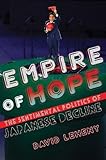Empire of Hope : The Sentimental Politics of Japanese Decline / David Leheny.
Material type: TextPublisher: Ithaca, NY : Cornell University Press, [2018]Copyright date: ©2018Description: 1 online resource (246 p.) : 7 b&w halftonesContent type:
TextPublisher: Ithaca, NY : Cornell University Press, [2018]Copyright date: ©2018Description: 1 online resource (246 p.) : 7 b&w halftonesContent type: - 9781501729089
- Emotions -- Political aspects -- Japan -- History -- 20th century
- Emotions -- Political aspects -- Japan -- History -- 21st century
- National characteristics, Japanese
- Political culture -- Japan -- History -- 20th century
- Political culture -- Japan -- History -- 21st century
- Asian Studies
- Political Science & Political History
- Sociology & Social Science
- POLITICAL SCIENCE / Political Ideologies / Nationalism & Patriotism
- Japan, emotion, politics, narrative, national identity
- 306.20952 23
- JQ1681 .L45 2019
- online - DeGruyter
| Item type | Current library | Call number | URL | Status | Notes | Barcode | |
|---|---|---|---|---|---|---|---|
 eBook
eBook
|
Biblioteca "Angelicum" Pont. Univ. S.Tommaso d'Aquino Nuvola online | online - DeGruyter (Browse shelf(Opens below)) | Online access | Not for loan (Accesso limitato) | Accesso per gli utenti autorizzati / Access for authorized users | (dgr)9781501729089 |
Frontmatter -- Contents -- Acknowledgments -- Conventions -- 1. Maybe They Will Smile Back -- 2. Souls of the Ehime Maru -- 3. Cheer Up, Vietnam -- 4. Cool Optimism -- 5. Staging The Empire of Light -- 6. The Peripheral U-Turn -- 7. Everything Sinks -- Notes -- Index
restricted access online access with authorization star
http://purl.org/coar/access_right/c_16ec
Empire of Hope asks how emotions become meaningful in political life. In a diverse array of cases from recent Japanese history, David Leheny shows how sentimental portrayals of the nation and its global role reflect a durable story of hopefulness about the country's postwar path. From the medical treatment of conjoined Vietnamese children, victims of Agent Orange, the global promotion of Japanese popular culture, a tragic maritime accident involving a US Navy submarine, to the 2011 tsunami and nuclear disaster, this story has shaped the way in which political figures, writers, officials, and observers have depicted what the nation feels.Expressions of national emotion do several things: they construct the boundaries of the national body, they inform and discipline appropriate expression, and they depoliticize messy problems that threaten to produce divisive questions about winners and losers. Most important, they work because they appear to be natural, simple and expected expressions of how the nation shares feeling, even when they paper over the extraordinary divergence in how the nation's citizens experience each incident. In making its arguments, Empire of Hope challenges how we read the relations between emotion and politics by arguing—unlike those who build from the neuroscientific turn in the social sciences or those developing affect theory in the humanities—that the focus should be on emotional representation rather than on emotion itself.
Mode of access: Internet via World Wide Web.
In English.
Description based on online resource; title from PDF title page (publisher's Web site, viewed 26. Apr 2024)


